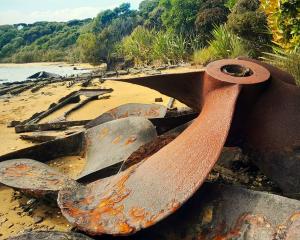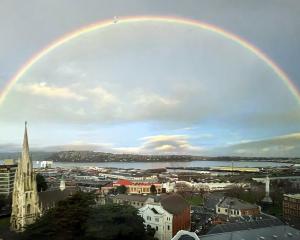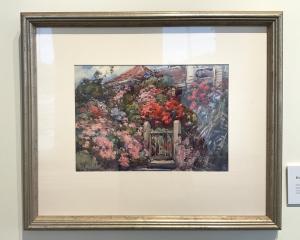Six60's sophomore album has again put the former Dunedin band into the charts - as well as opened international doors. But, as singer Matiu Walters tells Shane Gilchrist, the journey to this point has involved some serious soul-searching.
Gate-crashers ... Six60 knows a fair bit about the subject.
Certainly, the five members of the former Dunedin, now Auckland-based band are used to parties.
A few weeks ago, they marked the release of a self-titled second album with a not-quite-impromptu gathering that spilled over backyards, balconies and roofs near the Castle St scarfie flat that inspired the group's name.
And though invitations might be deemed unnecessary in the rapid-response world of social media, Six60's presence at another function could be regarded as both cheeky and entrepreneurial.
The occasion?
The album release party for Kim Dotcom's early-2014 effort Good Times.
How did Six60 get there?
By bus.
As singer and guitarist Matiu Walters explains: ''We'd just done a radio interview and snuck on the bus that was going to Dotcom's release party.
''At the time, we were doing some recording in Studio B at Neil Finn's Roundhead Studios. Dotcom was in the main studio. We heard there were some big producers in town, recording Dotcom's album. We saw it as an opportunity ...''
The endeavour paid off. Walters, who co-owns a boxing gym in Auckland and keeps in shape via regular bouts with keyboardist and co-writer Marlon Gerbes, managed to corner Grammy-winning American producer Printz Board, best known for his work with international hip-hop stars the Black Eyed Peas.
''We met Printz Board and the next day he came to the studio and it went from there,'' Walters explains.
''I played him a song and he was so excited. Three hours later, we had Special. The lead single off Six60's second album, Special entered the New Zealand charts at No 1 and is now certified platinum."
The album itself, released a fortnight ago, also went straight to the top of the album charts, a position it still holds this week. And second single So High is at No 10, having spent six weeks in the top 40.
More significantly, however, is the fact the group is currently negotiating a deal with Capitol Records, a move that could prompt a shift to Los Angeles, and the release and promotion of Six60's songs to a global market.
As an industry source said this week: ''They've just signed with Atom Factory management in the United States, who also manage the likes of Miguel, Meghan Trainor, John Legend and so on. They're looking after trying to sort a deal for Six60 in the US.''
Although Walters would prefer not to discuss the Capitol deal, the 27-year-old singer does admit to being more than a little excited about the prospect.
''I think we've done pretty well in New Zealand ... but there is so much for us to prove and do. The way I look at life is that I haven't done anything. And I think that's a good way to be. It keeps the fire burning.
''We don't have millions of international sales or a Grammy. There is so much more to prove. Hopefully, a move to America is just around the corner. We want to become established internationally.
''Ultimately, I want to operate at a level where I can continue to write music and not worry about anything else.
''I'm really proud of the [new] album. I think it's a good representation of who we are and, hopefully, it will open so many more doors in regards both the music we can write.''
• To gain a better understanding of Six60's latest release, it is perhaps best to chart the group's progress in the three and a-half years between its debut album and its sophomore effort.
Recorded over just two weeks at The Lab, Auckland, Six60's 2011 self-titled debut album entered the New Zealand charts at No 1.
According to the group's New Zealand label, Universal, the album has generated sales of more than 180,000 singles (including Forever and Lost) and has subsequently gone quadruple-platinum.
Nominated for three categories at the Vodafone New Zealand Music Awards in 2011, the band did better the following year, winning six Tuis (best single, people's choice, best group, highest-selling New Zealand album, highest-selling New Zealand single and the New Zealand radio airplay record of the year).
The success of that first album caught Six60 a little by surprise, Walters reflects.
Cue a move from Dunedin to Auckland early in 2012 and a hectic touring schedule that included high-profile performances at festivals such as Glastonbury in England and SXSW in Texas.
Having inked a promotion and distribution deal with Universal NZ, with the band retaining rights to its music via its own imprint, Massive Entertainment (an arrangement that still stands), Six60 signed with Sony offshoot Columbia Four Music in 2013 in the hope of raising its profile in Europe.
To further those ambitions, the band left New Zealand and spent several months in Berlin that year.
However, frustrations with Columbia Four prompted a return home.
''There were so many things happening,'' Walter ruminates.
''The band, internally, were a bit lost,'' he says, referring to Gerbes (keyboards), James (Ji) Fraser (guitar), Chris Mac (bass) and Eli Paewai (drums).
''Things probably weren't going the way we had thought they would pan out. We attempted to write the album multiple times: once before we moved to Berlin, then while we were there.
''But Berlin wasn't really the best time for us. It was kind of like those nightmare stories you hear of bands signed to major labels; we bumped heads a bit.''
And bands can be weird, Walters points out.
''It's kind of like when brothers fight. We love each other but we do fight.
''I'm definitely not a peacemaker. I try to get the best out of the boys. I try to drive and encourage people as much as I can. Some people don't like that, but it's just what I do.
''When we first started we had five chiefs, but we have intentionally changed things in order for the band to continue.
''The past three years have been a time of working out what we needed to do to move forward. We became a bit more comfortable with the way we wanted to do things,'' Walters explains.
''We had been touring so much that we had never really set aside enough time to work on the album. So coming back from Berlin, we thought it would be the last attempt to give the album a crack.
''Marlon, the keyboard player, and I like to work in the same way. The two of us bound together with our writing and we found Printz Board. We basically wrote the entire album, whereas in the past it would be the five of us all jostling to find something everyone was happy with.''
• That change in internal dynamics is clearly evident when comparing the group's earlier releases to its latest.
Built around a framework of roots-reggae featuring fluid guitar lines and fleshed out by synth textures, its 2008 self-titled EP captured what Walters now describes as a ''naive'' bunch of musician mates.
Nevertheless, it included the single Don't Forget Your Roots, which peaked at No 2 and held a place in the New Zealand top 40 for more than three months before later returning for 104 successive weeks (as of this week).
Another single off that EP, Rise Up, reached No 1 several weeks after entering the charts in September 2010.
Likewise, Six60's debut album featured plenty of slinky guitars, both acoustic and electric, provided by Walters and Fraser.
Yet, for the group's new album, the guitars have been pushed well back in the mix.
In their place are stacked vocals, supported by high harmonies, all of which are well to the fore, as are the keyboards, the drums and the bass.
In short, there is more space and, consequently, more groove.
It's upbeat soul suffused with funk, rock, hip-hop and points in between.
''The guitar solos [or lack of] are probably the most obvious difference,'' Walters says.
''There were just so many unnecessary things on the first album. For instance, I would riff vocally for four bars. With this album, we've had the balls to cut all that out.
''This album is a true representation of what we wanted. It is a progression of our music.''
Recorded at Six60's own M Studios and at Neil Finn's Roundhead Studios in Auckland, the album clearly benefits from some hired talent, from the skills of engineer Neil Baldock (whose credits include Crowded House and Shihad) to Grammy Award-winning, Los Angeles-based mixer Tony Maserati (Lady Gaga, Beyonce and James Brown, among others).
''It became evident through the process of attempting to record this album that you learn so much more when you are out of your comfort zone,'' Walters reflects.
''We tried to work with as many different people as possible, from Nashville country writers to soul and rock people ... and the two people we hit it off with the best were Printz Board and David Kahne [Paul McCartney, Sublime, The Fugees, The Strokes and Lana Del Rey]. He was very instrumental as well.
''To me, the creative process sometimes involves surrounding yourself with people who can elevate you.''
Printz Board knows a lot about beats-infused pop hits. His work with Black Eyed Peas aside, other clients include Justin Timberlake, Dr Dre and Katy Perry.
Yet his role with Six60 had more to do with providing the band with some timely confidence than supplying musical hooks.
''We were searching for help and we found that in Printz Board. We hit it off well,'' Walters says.
''He didn't really change our direction, just added bits and pieces here and there and gave us a taste of where we'd always wanted to be, musically.
''It would have been so easy for us to do the same thing. I think the first album got people's attention, but this album is the one that is opening doors.
''It was about finding that mindset we had when we started out, which was not giving a s*** and just having fun.
''That said, we have always thought fairly big. We never just wanted to be a party band.''
Which brings us back to the beginning.
The core of Six60 met in 2005 while at Dunedin's Unicol, the halls of which echoed to the fledgling band's roots-reggae covers, including New Zealand outfits Katchafire, Kora and Trinity Roots.
From there, the group's core decamped to 660 Castle St, where it continued to build a repertoire that satisfied requests at 21sts, house parties and local bars.
For its first gig out of Dunedin, at Al's Bar in Christchurch, Six60 was booked for a Thursday night.
The venue's management under-staffed the bar.
The gig turned out to be a sellout.
A key stage in the band's life cycle came in early 2009.
On the back of the release of its self-titled EP in December 2008, while playing at the Peak Festival in Queenstown, the group members studied the other bands, took notes and arrived at a decision: to make music a career.
Yet music wasn't even on the radar when Walters left Auckland for Dunedin a decade or so ago.
''Growing up, I wanted to be a professional rugby player. I went to Auckland Grammar and headed to Dunedin to pursue a rugby career.
''However, I learnt more about pushing weights and statistics and kissing a*** than just playing the game.
''At the same time, we had formed Six60 as a covers band, a party band, as a way to get booze and girls.
''There came a point where I decided it was way more fun to write music than do anything else. I was being creative and having complete control of my direction.''
Walters, who graduated with a law degree, agrees with the observation he and his band-mates could be regarded as gate-crashers in a wider sense.
''I don't think I have anything in common with fellow musicians. I think we exist outside the system almost.
''We are not interested in following others. Sure, there are people we admire. But we are our own beast and are confident in what we do.
''I'd be the first to say that we are not the best musicians in the world, but we play with a lot of intent and feel and honesty.
''I think people get that.
''We are just normal, rugby-playing Kiwis.''
Catch them
• Six60's self-titled second album is out now. As part of a nationwide tour, the group performs at Dunedin Town Hall on May 30.











